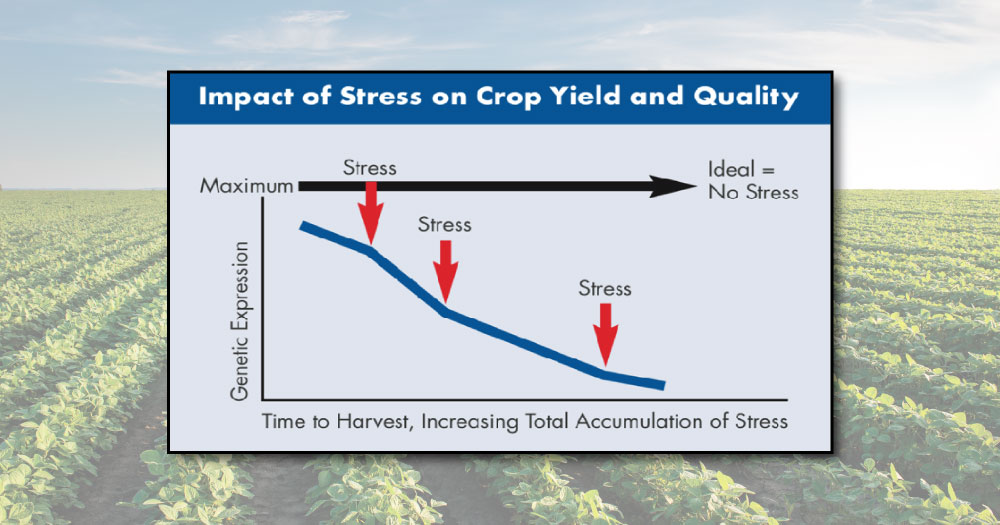Impact of Stress on Crop Yield and Quality
There are things in crop production we can see that we can control. For the things we can’t see (inside the plant) and can’t control (Mother Nature), what do we do?
Every producer understands the importance of good seed and genetics, good fertility, and good control of weeds, disease and insects. These are the things you can see and control! However, after all of these areas have been addressed, why do crop yield and quality often turn out to be unsatisfactory?
Stoller’s Plant Performance Program is a new and innovative technology for managing the things you can’t see and can’t control to increase crop genetic expression.
Genetic expression is compromised by stress, usually from unfavorable weather. Stress results in an imbalance between growth hormones (auxin, cytokinin and gibberellic acid) and stress hormones
(ethylene and abscisic acid). This hormone imbalance tends to shift the movement of sugars predominantly to the upper part of the plant (apical meristem) resulting in uncontrolled vegetative growth.
Excessive vegetative growth leads to weaker roots and decreases in fruiting part (fruit, seed, tubers, etc) number, size, uniformity and quality.
The Plant Performance Program consists of treatments to maintain the appropriate hormone balance throughout the growing season to make plants more resistant to stress, thereby facilitating the expression of their full genetic potential in terms of enhanced yield and quality. Biotechnology and breeding provide the genetic potential, the Plant Performance Program helps to realize it.
What is the Plant Performance Program?
Stoller’s Plant Performance Program is based on supporting optimum growth when weather or other stress conditions cause hormone imbalance. Treatments consist of compounds that work together to
ensure optimum hormone balance and activity. These compounds are necessary for consistent and reliable crop responses under a wide range of unpredictable and variable conditions.
- Treatments are designed to provide specific hormone balance at key developmental stages for different crop types
- It supports the plant’s ability to withstand the stresses limiting optimum growth.
The external factors that affect plant hormone balance are unpredictable and variable:
- Weather
- Crop cultivars and varieties soil type
- Condition and fertility
- Tillage and agronomic practices
- Pests
Stoller Plant Performance Principles
- Root tips serve as the “brains” of the plant; the growth control center, regulating all plant growth processes. It focuses on maintaining vigorous root growth throughout the life cycle of the plant.
- Genetic expression is affected from the time the seed germinates or when perennial plants begin to grow. Treatment must start early at seeding, transplanting or just before plants break dormancy.
- Root caps respond to the environment and signal the plant to absorb nutrients and produce hormones. Every 7-14 days the root cap cells die, are sloughed off, and must be replaced by new
cells. Without this replacement process, there will be fewer roots and root tips with the capacity to synthesize plant hormones and control plant growth. For this reason, an optimal Plant Performance Program is based on continuing treatment every 7-14 days through to harvest. Soil and/or foliar treatments throughout the season will maintain and enhance the benefits gained from initial seed starter fertilizer, transplant or in-furrow treatment to minimize the impact of stress conditions. - The “Law of the Minimum” in terms of nutrition plays a key role. The nutrient in shortest supply limits genetic expression during each stage of plant development. Plant hormones, supporting nutrients and other compounds work together to ensure appropriate hormone balance throughout the different growth stages of the plant. The appropriate combination of ingredients ensures consistent and reliable crop responses. Regular application of plant hormones in combination with supporting nutrients allows the plant to choose and use what it needs, when it needs it.
Contact your Stoller sales representative for more information.

